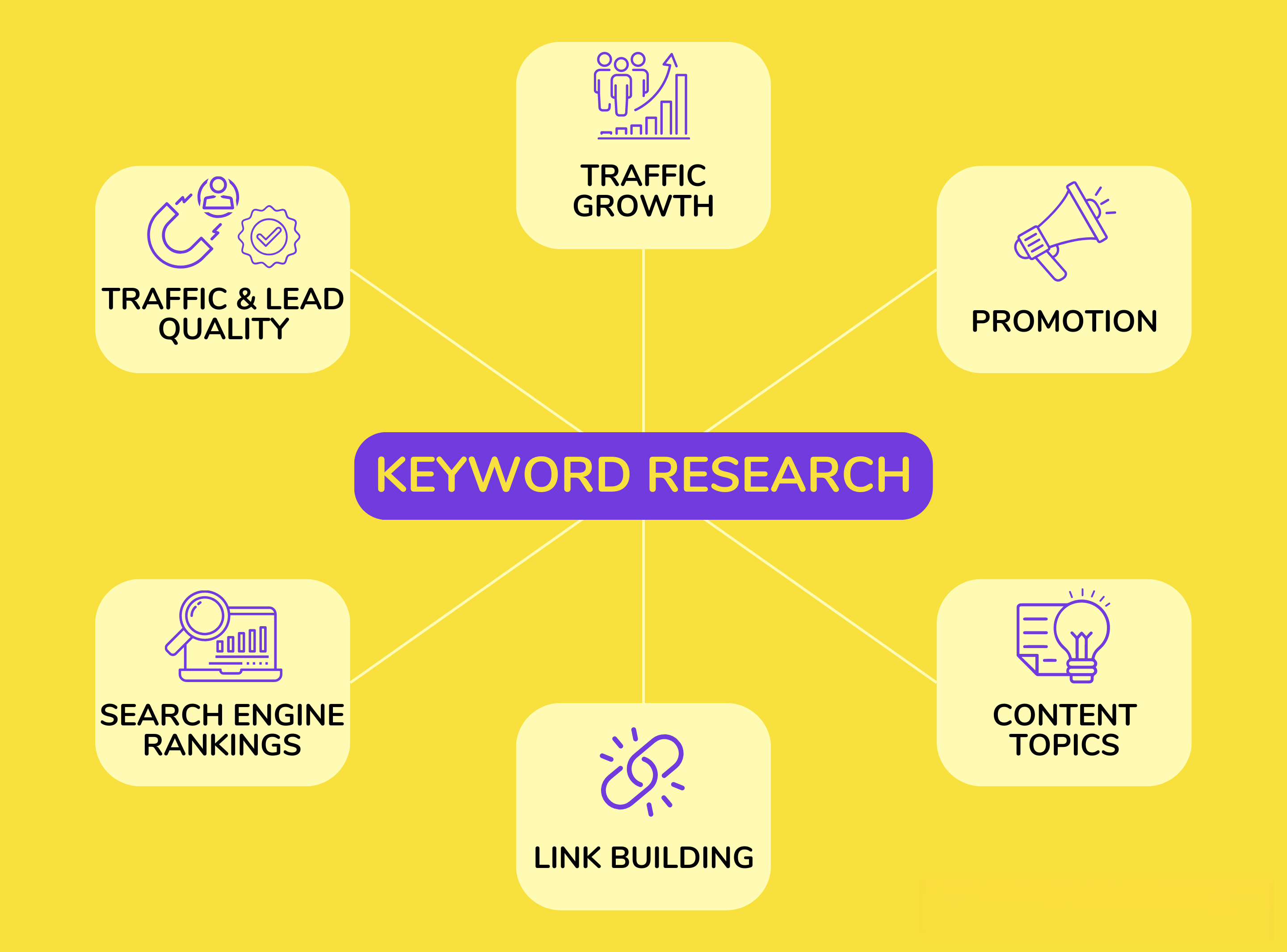Keyword Research Tool
The Keyword Research Tool helps you identify valuable keywords for your SEO and content marketing strategies. This tool is perfect for SEO professionals, content writers, and marketers who need to find high-performing keywords to improve their search engine rankings and drive more traffic. The process is comprehensive and user-friendly, providing insights into search volume, competition, and trends for optimal keyword selection.
Share on Social Media:
Top Free Keyword Research Tool: Elevate Your SEO Game
In search of the best keyword research tool? Learn which free options will sharpen your SEO tactics. No frills—just clear, actionable insights into tools that help you understand search terms, volumes, and SEO strategy essentials.
Key Takeaways
Keyword research tools are essential for uncovering high-volume keywords, assessing keyword difficulty, and analyzing competitor keywords, with popular options including Google Keyword Planner, PagesTools.com, SEMrush, Ahrefs, and Moz Keyword Explorer.
Advanced keyword research involves utilizing tools to prioritize keywords based on factors like relevance, authority, and search volume, and organizing keywords into clusters for strategic content targeting.
Free keyword research tools like the one offered by PagesTools.com can provide a spectrum of keyword suggestions, industry-specific information, and PPC insights, aiding in the refinement of content optimization strategies.
Unlocking Keyword Potentials: A Guide to Free Tools

Exploring keyword research can often resemble an exciting treasure hunt. Each keyword is a nugget of gold, holding the potential to drive search engine traffic and boost both SEO and PPC strategies. But how do we find these valuable keywords? That’s where keyword research tools come into play. Think of them as your treasure map, guiding you to new keyword ideas and revealing the depth of search volumes.
Some popular keyword research tools include the best keyword research tools such as:
Google Keyword Planner
PagesTools.com
SEMrush
Ahrefs
Moz Keyword Explorer
Ubersuggest
These tools can help you uncover high-volume keywords, identify keyword difficulty, and analyze competitor keywords. By using a keyword difficulty checker, you can optimize your content and improve your search engine rankings.
Google Keyword Planner is a recommended free tool for this research, particularly for paid keywords. We will now explore the process of selecting the perfect keyword research tool, understanding search volume data, and utilizing keyword suggestions to our advantage.
Choosing Your Ideal Keyword Research Tool
Selecting a keyword research tool is akin to choosing a compass for your treasure hunt. Access to key metrics like search volume, keyword difficulty, and intent is vital. Imagine setting sail without knowing the depth of the waters or the direction of the wind - that’s what keyword research would be without these metrics! An ideal tool should provide an organic keyword difficulty score and insights into keyword intent, assisting you in gauging how challenging it will be to rank for certain keywords and what users plan to do with their search queries.
Tools like Ahrefs and Moz’s Keyword Explorer are like a sailor’s trusted compass, offering up to 150 free keyword ideas with data on search volume, difficulty, and organic clickthrough rate for each keyword.
Navigating Through Search Volume Data
Navigating through search volume data can feel like charting a course through the vast ocean. It’s a crucial metric that indicates the frequency at which prospects search for particular keywords within an industry. Think of it as the wind in your sails, propelling your SEO strategy forward.
Keyword research tools assist users in identifying high volume keywords to target effectively in search engines. Advanced tools, like those provided by Moz, can predict search volume with a high degree of accuracy, offering over 95% reliability in their estimates, ensuring your sails are always filled with the strongest winds.
Harnessing the Power of Keyword Suggestions
As you sail the SEO seas, you’ll come across new lands and unexplored territories – and the same is true for keyword research. Keyword suggestions features in tools like Moz are your telescopes, allowing you to spot new keywords and topics that are relevant to your content.
For instance, with the Free Keyword Tool, you merely enter a keyword, choose the relevant industry and country, and you’ll receive a list of related keyword suggestions along with their search volumes, thanks to the free keyword generator. It’s like discovering a new island filled with treasure! And the best part is that there are free keyword research tools available to help you in this journey.
Crafting Your Keyword Master list

Once you’ve embarked on your keyword research journey and discovered your treasure trove of keywords, it’s time to organize your bounty. Crafting a keyword master list is like charting your discovered islands on a map. Your keywords should be organized into topic silos such as:
services
location
features
product categories
industry
This organization makes it easier to navigate your way back to these keyword treasures when creating content.
We will now explore the process of creating a keyword list, prioritizing keywords for optimal impact, and structuring keywords for strategic implementation.
From Research to Action: Building a Keyword List
Building a keyword list is the first step in turning your keyword research into action. It begins with brainstorming topic buckets related to your business and understanding your target audience. Gather as many relevant keywords as possible from these buckets and compile them into a list. This list should include terms your website already ranks for and cluster related search terms, categorizing them by relevance to the subject and user intent.
Once you have your list, it’s time to refine it by filtering keywords based on:
their relevancy to your content
search volume
competitive difficulty
their potential to drive conversions
Set clear content marketing objectives and involve stakeholders like customers and employees to provide additional keywords for analysis.
Prioritize Keywords for Maximum Impact
Now that you have your treasure map filled with keyword islands, it’s time to prioritize your destinations. When prioritizing keywords for SEO, consider the following factors:
Relevance: Choose keywords that are closely related to your content and target audience.
Authority: Focus on keywords that have a higher authority and are more likely to rank well in search engine results.
Search volume: Look for keywords that have a high search volume, as this indicates a higher potential for traffic.
PagesTools.com's Free Keyword Tool provides relevant keyword results, competition level, and estimated CPC for free, which can help in assessing the competitiveness and potential cost of targeting specific keywords.
Keywords should be prioritized based on search volume, intent to purchase, and low competition to maximize conversions and minimize ranking battles.
Organizing Keywords for Strategic Execution
Organizing your keywords is like planning your sailing route to efficiently reach each treasure island. Keywords should be organized into clusters based on topics, user intent, and other relevant factors like product type. Tools like PagesTools.com Keyword Lists can help you organize, track, and compare keywords, enhancing the efficiency and effectiveness of your keyword clusters.
Analyzing keyword difficulty using tools helps assess the competition level for each keyword, aiding in strategic keyword cluster formation. With a well-planned route, you’re set to sail the SEO seas.
Decoding the SERP Landscape

Imagine you’re sailing through uncharted waters. The SERP landscape can feel a lot like that. Decoding it involves identifying why pages rank where they do and the breakdown of ranking elements and link data. SERP features provide specific information or functionalities, surpassing traditional organic results in fulfilling searcher queries more effectively.
Grasping SERP features and user intent, scrutinizing competitors’ keywords, and monitoring keyword performance can guide you successfully through the SERP landscape.
Understanding SERP Features and User Intent
Understanding SERP features and user intent is like reading the weather patterns at sea. AI-driven semantic keyword analysis is crucial for understanding the context and user intent behind search queries, which directly informs content relevance and targeting. Integrating long-tail keywords into in-depth content aligns with user search intent and creates buyer personas that help understand and match audience search behavior. SERP features like featured snippets, local packs, and ‘People Also Ask’ boxes fulfill specific user intents, aiming to provide authoritative content and direct answers from the search results.
Tools such as PagesTools.com can indicate which SERP features are activated by particular keywords, supporting the enhancement of online visibility in search results.
Analyzing Competitors' Keywords
In the vast digital sea, you’re not the only sailor. Analyzing competitors’ keywords is like spying on rival ships to get a competitive edge. Gap analysis is instrumental in identifying keywords that your competitors rank for while your site does not, allowing you to discover low-competition, high-potential keywords.
Analyzing competitors’ meta tags and SERP performance can reveal valuable keywords and inform how to prioritize them in your SEO strategy based on search volume and competition. Moz Keyword Explorer and tools like PagesTools.com allow you to uncover a site’s organic search keywords for competitive benchmarking.
Tracking Keyword Performance
Tracking keyword performance is like checking your compass and map to ensure you’re on the right course. Some tools that can help you with this are:
Google Search Console: It provides insights into high impression search terms, allowing you to refine keywords to achieve better click-through rates and maintain successful SEO strategies.
Ahrefs: It gives detailed keyword performance data, aiding in performance improvements.
Semrush: It also provides detailed keyword performance data, helping you optimize your SEO strategies.
Using the keyword magic tool and other tools will help you track and improve your keyword performance.
Tracking keywords over time using tools like WordStream can help identify changes in search volumes and competition levels, essential for timely SEO strategy adjustments. The ebb and flow of the SEO seas require constant vigilance to ensure you’re on the right course.
The Role of AI in Keyword Research

Imagine if your ship could predict the wind and waves, guiding you to the best route and treasure islands. That’s what AI does in keyword research. An AI keyword tool aids in identifying valuable keywords for SEO by understanding search patterns and analyzing large sets of data.
We will now explore the influence of AI on the future of keyword discovery and its limitations.
AI and the Future of Keyword Discovery
AI is like a futuristic compass, capable of analyzing vast data sets to discover long tail keywords accompanied by valuable metrics such as search volume, competition, and relevance scores. AI-driven tools enhance keyword research by generating customized keyword suggestions aligned with a user’s existing content and strategic goals to boost online visibility.
Technologies like ChatGPT can be used to forecast search trends and generate a list of related terms which serve as seed ideas for keyword research.
Limitations of AI in Keyword Research
Despite the advanced capabilities of AI, it’s not a magical compass that can do everything on its own. AI tools used in keyword research present limitations that necessitate human intervention. Like a seasoned sailor, human analysis is required to discern the most appropriate and valuable keywords from the options provided by AI tools.
The Synergy of SEO Tools

Sailing the SEO seas isn’t a one-compass journey. It requires an arsenal of navigational tools. Integrating different SEO tools can lead to a more comprehensive analysis, allowing businesses to understand the impact of individual keywords on traffic and conversions.
By using Analytics in tandem with keyword research tools, website owners can gain insights into user behavior, keyword-driven traffic, and conversion metrics. We will now explore the integration of Google Search Console and Keyword Tools and how to utilize Analytics for informed keyword selection.
Integrating Google Search Console and Keyword Tools
Just like a sailor relies on both a compass and a map, SEO professionals need to integrate Google Search Console with keyword research tools. This integration allows for tracking and improving website presence in search results and provides comprehensive analysis including search queries and click-through rates.
By linking Google Search Console with other tools such as Semrush, SEO professionals gain a centralized view of website data, making it easier to manage and improve SEO tasks.
Leveraging Analytics for Informed Keyword Choices
In the vast sea of data, it’s easy to get lost. That’s where analytics tools come in handy. Google Analytics 4 allows the creation of custom dimensions and metrics for deeper analysis of organic search keywords and user interaction.
By verifying website ownership and linking Google Search Console to Google Analytics 4, SEO professionals can track and monitor keyword performance to inform their strategy.
Advanced Keyword Research Techniques
Once you’ve mastered the basics of sailing, it’s time to learn some advanced techniques. The same applies to keyword research. Advanced filter options in keyword research tools can refine search results by location, language, or search engine, allowing SEO experts to target their analysis more precisely.
We will now explore the mastery of long tail keyword research and the identification of seasonal and trending keywords.
Mastering the Art of Long Tail Keyword Research
Long tail keywords are like hidden coves in the SEO seas - specific and less competitive, but offering a treasure trove of opportunities. Prioritizing long-tail keywords catered to niche audiences can capture high buyer intent, which is particularly effective for targeting seasonal and trending searches.
Incorporating these long-tail keywords into content is beneficial, offering a more fitting choice for blog posts than online ads.
Identifying Seasonal and Trending Keywords
Just as the wind changes with seasons, so do keyword trends. Using Google Trends can reveal newly popular topics before competitors, which may be overlooked by traditional keyword research tools. This tool allows you to identify popular keywords based on regional and seasonal trends, giving you a competitive edge.
Free Keyword Research Tool by PagesTools.com
As you sail the SEO seas, it’s important to have a reliable compass. The free keyword research tool by PagesTools.com is just that. It analyzes 500 related keywords, providing a broad spectrum of relevant terms for your content strategies.
With features like industry-specific competitive information, downloadable reports, and PPC campaign insights, this tool refines your keyword research using Google’s suggestions, including google ads, streamlining the process of content optimization.
Summary
With the right compass, map, and sailing techniques, the vast SEO seas become a playground filled with treasure islands. Mastering keyword research and leveraging free tools can elevate your SEO game, driving more search engine traffic and boosting your SEO and PPC strategies. Whether you’re a seasoned SEO sailor or just starting your journey, remember that the key to successful SEO lies in understanding your audience, choosing the right keywords, and constantly refining your strategy based on data.
Frequently Asked Questions
Why is keyword research important for SEO and PPC strategies?
Keyword research is crucial for SEO and PPC strategies as it helps identify relevant keywords that your audience is searching for, driving more traffic and improving overall performance.
What are long-tail keywords and why are they important?
Long-tail keywords are specific phrases with less competition, leading to better-targeted traffic and higher conversion rates. They're important for capturing high buyer intent and can be effective for targeting seasonal and trending searches.
How can I use Google Trends for keyword research?
You can use Google Trends to identify popular keywords based on regional and seasonal trends, giving you a competitive edge by revealing newly popular topics before competitors.
What are the limitations of AI in keyword research?
Although AI can analyze extensive data for keywords, it still requires human input to determine the most valuable and relevant keywords. Human intervention is essential to select the most appropriate keywords from AI-generated options.
How can I prioritize keywords for maximum impact?
Prioritize keywords based on relevance, authority, and search volume. Use tools like PagesTools.com's Free Keyword Tool to assess competitiveness and potential cost of targeting specific keywords.